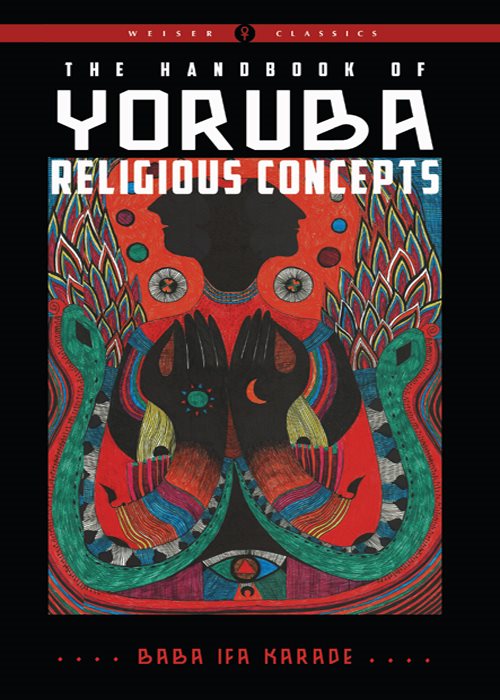

THE WEISER CLASSICS SERIES represents the full
range of subjects and genres that have been part of Weiser's
publishing program for over sixty years, from tarot,
divination, and magick to alchemy and esoteric philosophy.
Drawing on Weiser's extensive backlist, the series offers works
by renowned authors and spiritual teachers, foundational
texts, as well as introductory guides on an array of topics.

THE HANDBOOK OF
YORUBA
RELIGIOUS CONCEPTS
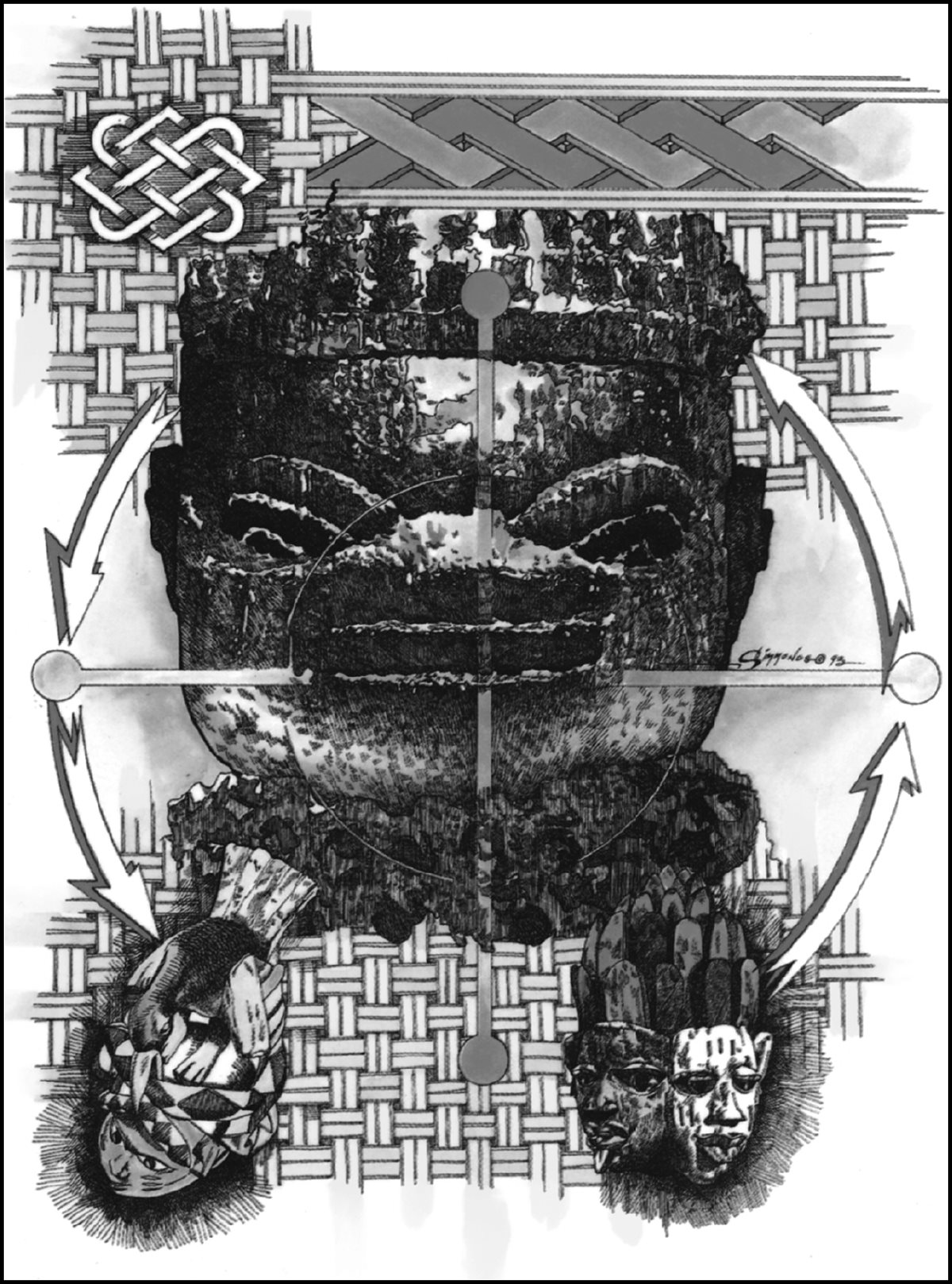
THE HANDBOOK OF
YORUBA
RELIGIOUS
CONCEPTS

REVISED EDITION

BABA IFA KARADE

This edition first published in 2020 by Weiser Books an imprint of
Red Wheel/Weiser, LLC
With offices at:
65 Parker Street, Suite 7
Newburyport, MA 01950
www.redwheelweiser.com
Copyright 1994, 2020 by Baba Ifa Karade
All rights reserved. No part of this publication may be reproduced or transmitted
in any form or by any means, electronic or mechanical, including photocopying,
recording, or by any information storage and retrieval system, without permission in
writing from Red Wheel/Weiser, LLC. Reviewers may quote brief passages.
Previously published in 1994 by Red Wheel/Weiser, ISBN: 0-87728-789-9.
This book describes certain practices that are traditional to Yoruba, including animal
sacrifice. The publisher does not advocate such practices, but as they are a part of
Yoruba belief and ritual, they are represented here.
ISBN: 978-1-57863-667-9
Library of Congress Cataloging-in-Publication Data available upon request.
Cover photograph Full Moon, Nedelcheva-Williams, Zanara/Sabina / Bridgeman Images
Frontispiece: Adura, by Oswald Simmonds
Typeset in Palatino
Printed in Canada
MAR
10 9 8 7 6 5 4 3 2 1
Series Editors
Mike Conlon, Production Director, Red Wheel/Weiser
Judika Illes, Editor at Large, Weiser Books
Peter Turner, Associate Publisher, Weiser Books
Kathryn Sky-Peck, Creative Director, Red Wheel/Weiser
www.redwheelweiser.com/newsletter
CONTENTS
Acknowledgments
To Olodumare, Orunmila, Ori a, and Egun.
a, and Egun.
To the elders of Ile Iya Olori a in Ejigbo, Nigeria, Africa. Special appreciation to Chief Araba Malomo and Iyanla Keye for initiating me into the Yoruba sacerdotal orders of Obatala and Ifa.
a in Ejigbo, Nigeria, Africa. Special appreciation to Chief Araba Malomo and Iyanla Keye for initiating me into the Yoruba sacerdotal orders of Obatala and Ifa.
To Apetebi  okoya Onayemi Aya Karade for her editing, insight, word processing, illustration, and loving support.
okoya Onayemi Aya Karade for her editing, insight, word processing, illustration, and loving support.
To all my teachers and mentors, including Afolabi Epega of Nigeria, Chique Valdez of Puerto Rico, and Oba Oseijeman Adefunmi I of Oyotunji, South Carolina.
I would also like to personally thank all members/initiates of Ile Tawo Lona (Temple of the Mystic Path) and all who've embraced the Yoruba spiritual/religious tradition.
A Note to the Reader
WHENEVER CULTURES INTERFACE, either through conquest or through peaceful assimilation, the dominant cultural religious structure will extract the more positive aspects of the subjugated culture. What's left in its wake are the negative aspects. People generally accept this negativity because it's the part of the origin or tradition that is presented by the dominant culture. For example, in respect to the Yoruba religious practice, what's left is the negative voodoorootshoodoo mentality. This view is devoid of sacred realities born of African thought in respect to religion, philosophy, culture, and dignity. It's becoming quite apparent that the negativity we're subjected to is but a mere shadow of the greatness of a vast and empowering African tradition.
Those seeking their traditional heritage will eventually face the spirituality of their ancestors. When this facing occurs, a deep psychological rift is formed. On one side is the societal dominant religious structure; on the other is the infinite ancestral structure. Adherents to the ancestral Yoruba must be aware of the dangers when crossing the abyss. Spiritual enlightenment, deep study, and gradual acceptance will provide the strength, courage, knowledge, and wisdom necessary to grow, mature, and ultimately transcend.
INTRODUCTION
TO REINVESTIGATE THE AFRICAN cultural structure is to reawaken and strengthen the African conceptual consciousness. In respect to religion, concepts are philosophical and transcendental aspects of developmental sciences. They're the fundamental ethos and worldview of a peopleof a culture. To be able to conceptualize is one of the higher orders of thinking which inevitably leads a person or people to a greater logic. What's conceived or born from this logic is that oneness with the potential of the Creative Essence brings about oneness in the potential of the human essence. The tenets of Yoruba revolve around this basic concept.
Understandings leading to the acceptance and the actualization of logic in spiritual development are often defined as mystical. The major error of many seekers and adherents of the Yoruba faith is that they confuse mysticism with occultism. Mystical searching has no relation whatsoever in aim or means to phenomena or powers known as occult.... The aim of man's mystical search is to acquire an imperishable consciousness through a progressive communion of his physical body (his temporal reality), with his spiritual being (his immortal reality), and his kinship with his divine cause. It's of the utmost importance that we in this faith strive to understand the way of mystics who set out to harness the energies of existence for the greater good as opposed to those who strive to manipulate those energies to bring about harm, suffering, and discontentment.
Relatedly, basic fundamental concepts of the Yoruba faith have been misinterpreted in the New World. The mysticism of its core has been overshadowed by the occultism of those who extracted and portrayed only the shadowone present in all religionsthat exist.
The aim of the mystic or Yoruba sacerdotal orders isn't to dwell upon occult powers but to seek divine essence and balanced character via the Ori as, the Odu-Ifa, egun, and one's ori. From a conceptual standpoint, this is all-pervasive and all-important. Seekers or aspirants of the Yoruba religion must be constantly reminded, as reiterated throughout this book, that Yoruba isn't a cult nor is it occult. Yoruba is a divine journey to the inner self and to God-Consciousness. Yoruba is our religion. Yoruba is our existence.
as, the Odu-Ifa, egun, and one's ori. From a conceptual standpoint, this is all-pervasive and all-important. Seekers or aspirants of the Yoruba religion must be constantly reminded, as reiterated throughout this book, that Yoruba isn't a cult nor is it occult. Yoruba is a divine journey to the inner self and to God-Consciousness. Yoruba is our religion. Yoruba is our existence.
The indigenous Yoruba has a belief in the existence of a self-existent being who is believed to be responsible for the creation and maintenance of heaven and earth, of men and women, and who also brought into being divinities and spirits who are believed to be functionaries in the theocratic world as well as intermediaries between mankind and the self-existent Being. The Yoruba word for God is both
Next page
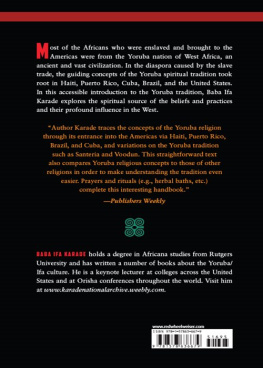

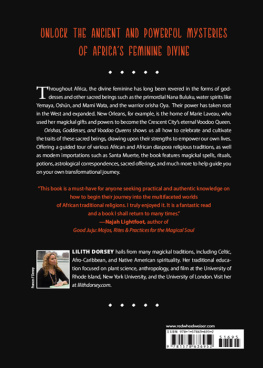
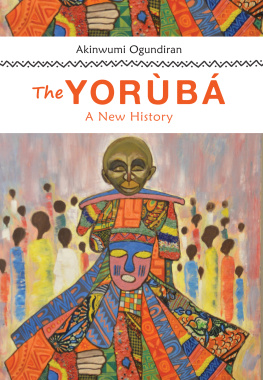






 a, and Egun.
a, and Egun. a in Ejigbo, Nigeria, Africa. Special appreciation to Chief Araba Malomo and Iyanla Keye for initiating me into the Yoruba sacerdotal orders of Obatala and Ifa.
a in Ejigbo, Nigeria, Africa. Special appreciation to Chief Araba Malomo and Iyanla Keye for initiating me into the Yoruba sacerdotal orders of Obatala and Ifa. okoya Onayemi Aya Karade for her editing, insight, word processing, illustration, and loving support.
okoya Onayemi Aya Karade for her editing, insight, word processing, illustration, and loving support.